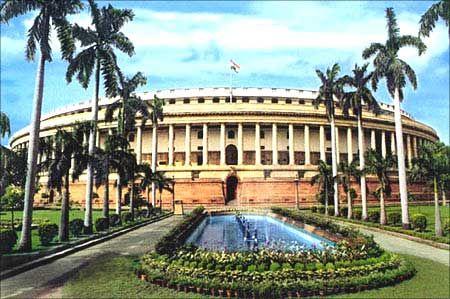 | « Back to article | Print this article |
FinMin confident of pushing reforms in Budget
The finance ministry has exuded confidence on moving ahead with financial reform Bills in Parliament's Budget session, slated to start from February 21.
This is despite expectations of a stormy session, given the unresolved standoff on the Opposition's insistence on a Joint Parliamentary Committee probe into the telecom spectrum controversy.
The Bills include amendment of the Insurance Act to raise the cap on foreign direct investment in private sector insurance companies to 49 per cent from the present 26 per cent and the one on pension reforms.
"We expect to introduce the Insurance Amendment bill, the Pension Fund Regulatory and Development Authority Bill, the Banking Regulations (Amendment) Bill, LIC (Amendment) Bill, Factoring and Assignment of Receivables Bill and the Sarfaesi Bill," a key ministry official said.
Click NEXT to read on . . .
FinMin confident of pushing reforms in Budget
Driving growth
Financial sector reforms are expected to be the next driver of economic growth. The political manoeuvring space to push these was missing when the Left parties were supporting the 2004-09 UPA government.
Once the Left withdrew support, a few months before UPA-I's term ended, the government was able to table the Insurance Laws (Amendment) Bill in the Rajya Sabha.
The Bill is with the Standing Committee on Finance. Apart from the FDI cap issue, it aims at statutory powers to the pension regulator, which has been acting as an interim watchdog.
The pensions Bill is deemed necessary to push the New Pension System, formally open to all citizens. Unlike the old pension system for government employees, NPS is based on defined contributions. All central government employees are already part of NPS since January 1, 2004, and many state governments have also opted for it. However, citizens have opted for it in very minute numbers only.
Click NEXT to read on . . .
FinMin confident of pushing reforms in Budget
Others
The Banking Regulations (Amendment) Bill, among other issues, aims to raise the voting power of foreign entities in private sector banks in proportion to their stake, against the current cap of 10 per cent.
The LIC (Amendment) Bill is to raise the paid-up capital of the state-run insurer to Rs 100 crore from Rs 5 crore at present, to bring it at par with private sector insurance companies.
The Factoring and Assignment of Receivables Bill, 2010, proposes to regulate this sector and offer stamp duty exemption for this business. The factoring business means selling of account-receivables by the owner of a company to a third party at a discount for meeting cash needs. This business has not made much progress due to lack of a consolidated framework.
Click NEXT to read on . . .
FinMin confident of pushing reforms in Budget
The Bill amending the Sarfeasi Act (on securitisation and reconstruction of financial assets) proposes a computerised ventral registry to keep records of loans mortgaged by securities.
The registry, once operationalised, would help check fraud in the sale and mortgage of property, by providing to a bank or a buyer its details at the click of a computer mouse.
These Bills, if enacted, says the government, would help realise the projections for expanding the Indian economy by nine per cent next year.




